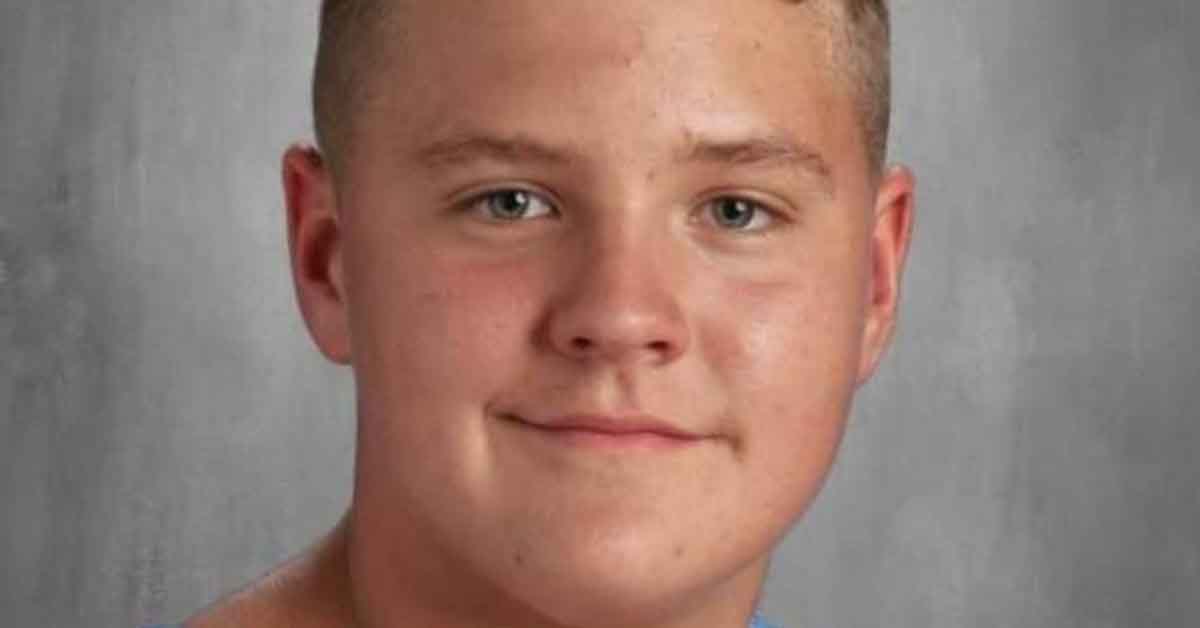On May 6, 2022, Jagger Shaw — an eighth-grader at Liberty Middle School in Papillon, NE — started the day like every other school day.
His father, Tom Shaw, picks up the story from a Facebook post the day following:
I dropped jagger off at school yesterday around 745am gave him a hug and kiss told him to be good and have a good day like every time I dropped him off.
he asked the teacher if he could go to the office and get a snack. The teacher said you can have one of my granola bars so jagger took it and got halfway through eating it and felt like he was starting to have an allergic reaction and went to the nurses office at 9am.
The nurse gave him Benadryl and waited to see if it would calm his reaction. Jagger went to the bathroom to try to vomit and came back looking flushed.
The nurse then administered an epinephrine auto-injector and called emergency services. An ambulance arrived and took the boy to Midlands Hospital.
When Jagger arrived, he was having trouble breathing and was swollen everywhere. After suffering two bouts of cardiac arrest, doctors elected to transport him to a children’s hospital because they felt they were not equipped to handle his deteriorating condition.
Two minutes into the transport, Jagger’s heart stopped again and he went 20 minutes without oxygen to his brain.
When Jagger finally arrived at the children’s hospital, the staff performed CPR and were able to stabilize him but it was too late: the hypoxia he suffered when his heart stopped caused severe brain damage.
At 3:20AM, with no possibility that Jagger would recover, the family elected to have his breathing tube removed. He died a short time later at 3:45AM.
Yesterday, the Omaha World-Herald reported the Papillion La Vista Community Schools District reached a settlement with Jagger’s parents for a $1 million payment.
Said Annette Eyman, a spokesperson for the district: “Our thoughts are with the Shaw family. It’s such a tragic situation. Our hearts break for them.”
There is no settlement or words that can possibly console the Shaw family for the loss of their son. We send them our deepest condolences and those from the allergic community that grieves with them.
Now that the legal proceedings are behind them, we hope they are able to begin some semblance of healing.
As we do when we report all such tragedies, we look for strategies the community can take away to prevent similar tragedies from befalling others. Unfortunately, in this case, there are several.
We don’t know whether Jagger was allowed to self-carry epinephrine at school, but we encourage all parents of children able to self-administer to demand they be allowed to carry their auto-injectors. They should have two with them at all times and be trained to self-administer the moment they suspect an allergic reaction, then call for help.
We don’t know if Jagger had an emergency action plan in place with the school, but all children with food allergies should have such a plan devised and signed by their physician. The plan should be shared with all faculty and staff responsible for the student during school hours and they should be briefed on what is expected of them in case of an anaphylactic emergency. You can find templates from leading authorities for such a plan here.
We do know the school nurse opted to give Jagger Benadryl first which is NOT the procedure recommended by the American Association of Pediatrics:
Delayed epinephrine administration in anaphylaxis is associated with an increased risk of hospitalization and poor outcomes, including hypoxic-ischemic encephalopathy and death. Conversely, prompt prehospital epinephrine injection is associated with a lower risk of hospitalization and fatality.
H1-antihistamines prevent and relieve itching and hives but do not relieve life-threatening respiratory symptoms, hypotension, or shock; therefore, like H2-antihistamines and glucocorticoids, they are adjunctive treatments and are not appropriate for use as the initial treatment or the only treatment.
From the AAP’s report “Epinephrine for First-aid Management of Anaphylaxis”
Had an emergency action plan been in place and had the nurse followed it, epinephrine would have been administered sooner and a second dose would have been administered a few minutes later had the symptoms not subsided, all possibly leading to a better outcome.
We urge the parents of all school-age children to please heed the above strategies and discuss them with your child’s allergist, school nurse, and school administration.
- Papillion La Vista reaches $1 million settlement with eighth grader’s family — Omaha World-Herald
- Facebook Post — Tom Shaw
- Epinephrine for First-aid Management of Anaphylaxis — AAP
Epinephrine First, Period





